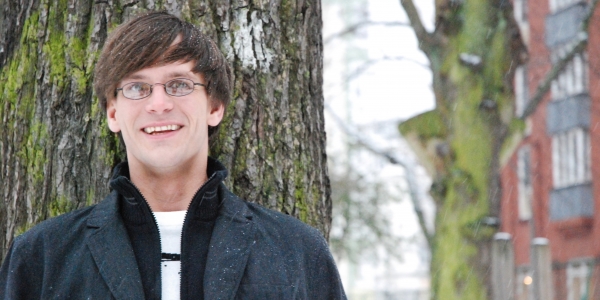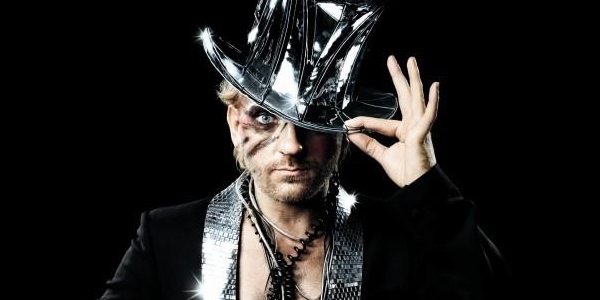Neelix aka Henrik Twardzik is not your typical DJ
Neelix aka Henrik Twardzik is not your typical DJ: he’s not of the breed who discovers dance culture in their adolescent club-venturing years and, whether inspired by passion, the allure of DJ superstardom, or an irresistible cocktail of both, immerses themselves in the art of electronic-music making. No, for Neelix it was the other way around: he stumbled across electronic music, fooled around, and unwittingly started producing psy-trance sounds all before attending his first electronic-music party.
But, as our chat reveals, the discordant tale doesn’t end there: the naturally talented Neelix attended his first doof little more than a decade ago, confesses to be ill at ease in the studio, and plans to produce pop music in the near future. What’s more, rather than the more-common serious, arrogant, headlining global trance DJ, Neelix has an almost boyish persona, a perpetually-smiling idealist with nerdy appeal (replete with thick-rimmed glasses, a bowl haircut, 90s-era skating pals, and an unflinching endorsement of all things techno)-and all this in the sweetest possible way. And yes, Neelix fans, you read correctly, pop music. This is not sweet. This is evil. But we’ll digest such heretical propositions later.
The 35-year-old German national was an electronic-music luddite unable to relate to computer-produced beats and dance-floor sounds until his early 20s. Home alone and bored, Neelix began fiddling with his housemate’s Macintosh and music-software program, Cubase. "I was sure that computer and electronic music sucked. I played guitar and drums for years, but in 1999 I lived with a friend who produced music on his computer just for fun. When he wasn’t home and I felt bored, I fooled around with it. Not long afterwards I went to my first techno party, but I still didn’t really like electronic music that much."
After two years of said fiddling, Neelix was informed by a skateboarding peer, Alexander Dorkian, that his amateur off-the-cuff productions unwittingly emulated the sounds of psy-trance. Dorkian (a Hamburg progressive DJ aka Galactika), introduced Neelix’s still-raw electronic-music palate to the psy-trance scene, and a reflective Neelix labels the experience as the defining moment of his career to date. "Attending my first psy party is when it all really started for me, so thanks Alex!"
His impromptu foray into the electronic-music world has combined with an eclectic array of influences (Ennio Morricone, Mark Snow, Limp Bizkit, Symphonix, Vaishiyas, to name but a few) and resulted in a unique, incrementally-altering style. Neelix pauses briefly to muse about the evolution of his music in the years since his first album, Resident (2003). "Now my music is cleaner and less psy-trance. I like it. I like music that’s not stressful; I like music that is easy listening for your living room or car". His most recent album, Mind Your Step, was a joint project with compatriots Vashiyas. The contemporary sound is characterised by hypnotic trance backings punctuated with massive, spherically-surfaced bass notes woven together into a driving, voluptuous beat.
The shift from an initially raw, dirty psy-trance to a more sinuous, lubricious sound, has enabled Neelix’s music to attain his desired listening ease while maintaining its underground appeal – no easy feat. Yet, as he acknowledges, some diehard psy-trance fans may view the shift as a treacherous descent into the commercial realm. Either way, Neelix is quick to emphasise he is not a psy-trance DJ. "I play no psy music at all. Sorry for that", he explains with a hint of hurt and bemusement, "I don’t like it that these people sometimes try to make me feel bad. I don’t like that".
Admittedly, the mounting ballyhoo by psy-trance fans about the contemporary commercialisation of their traditionally underground style of music is cause for concern, but Neelix disagrees and has a message for those cynical heads directing the criticism: "I still think that in our scene we have the best people of all musical directions. Please spend more time to see the nice things in our events and don’t waste time searching for the bad things".
Admirable sentiment withstanding, his well-intentioned assertion that fans and critics alike should maintain a positive outlook regardless of the doof scene’s particular musical direction is somewhat idealistic. Though endearing, such romanticism ignores a crucial element of the psy-trance party scene: that fans attend precisely because of its disconnection from simplistic mainstream appeal.
Nevertheless, Neelix is now a seasoned international doof act and his opinion carries weight. He contends that, in part, psy-parties’ slight commercialism has arisen because the traditional psy-trance scene of yesteryear has morphed into a milieu of different genres. "First off I have to say, I don’t think that there is a real psy-trance scene existing any more. It’s split in two or three main genres. A psy-trance party is now: full-on [hard style], progressive trance and tech house. Worryingly, he also predicts the electro plague, which has reached Biblical proportions in the mainstream-festival scene, will enter psy-trance parties in the next few years.
According to Neelix, it’s the Australian party scene setting the global standard and he relates his intrigue and wonder at the diverse blend of attendees. "You’ve even still got hippies at parties!", he enthuses. "It’s actually the best scene I know. All kinds of people are there. There is no country on earth that has that great mix of people. I really mean it! The last tour in Australia was unbelievable! I’m really happy to come back soon". He continues and waxes lyrical about what he believes are the most exciting acts on the contemporary psy smorgasbord. "I like the new direction of Captain Hook, his music is different; I like when people have the power to try something new. I also love Symphonix, Vaishiyas, Audiomatic and Liquid Soul."
It’s refreshing to have such an earnest, likeable, friendly interviewee. The conversation is relaxed and the intricacies of psy-trance are a pleasure to discuss with someone as willing to share as Neelix. I can’t help but wonder whether the tone of discussion-seemingly revolving around arguments for and against the commercialism of an otherwise underground genre-is partly a justification for what Neelix perceives as a misunderstanding of what, to my ears, is an impressive musical style. As it turns out, my suspicions are warranted when Neelix reveals that he doesn’t yet think he’s "made it" and that his commercial ambitions extend beyond his present tendency of producing delicious servings of easy-listening-yet-thumping beats. And then, out of nowhere, a bombshell… "In the near future I think I’ll try to produce a bit of pop music… I just wanna give it a try. Who knows, could be fun and maybe it’s successful!" Say what?!
This is disturbing, especially for an artist who doesn’t yet think he’s made it (a humble reflection for someone producing the calibre of music he presently does while headlining alongside the likes of Quantize and Liquid Soul). The worrying thing is that, as alluded to above, he may rate success more highly by venturing into the mainstream world of pop music. In case such a wicked preachment eventuates, I encourage, no… I implore all readers to see Neelix live before such sinful ambitions take hold.
Neelix [GER] plays the Maitreya Festival with Cosmosis [UK] Flowjob [DEN] and more on Friday March 11 – 14 at the Pyrenees Ranges and the Maitreya Reconnect after party with S.U.N Project [DEN], Space Tribe [AUS], Vaishiyas [GER] and more on Saturday March 19 at the Hi Fi Bar.
Tim Retrot

